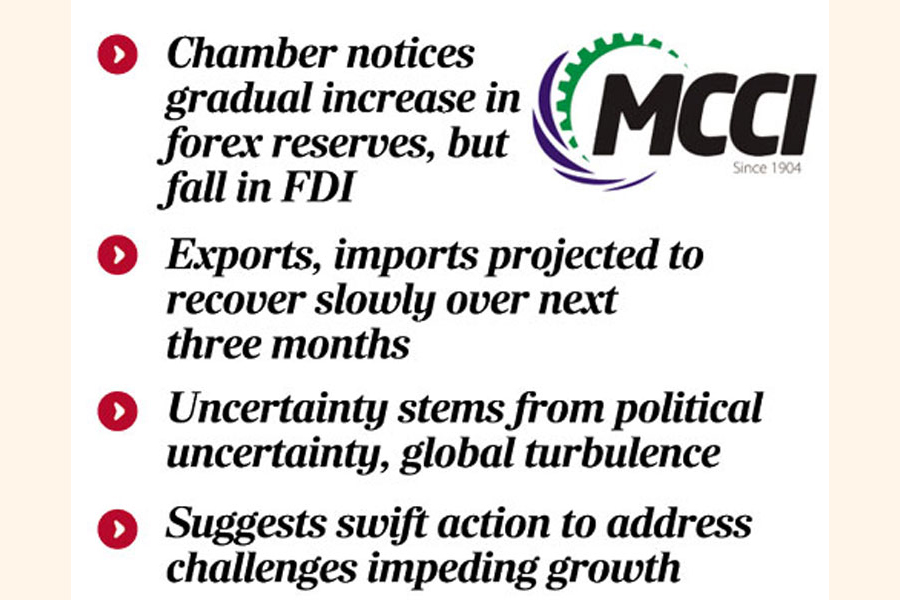
Published :
Updated :

Bangladesh's economy is gradually overcoming local and global headwinds with foreign-exchange reserves and export-import trade showing signs of a rebound, says a leading trade body.
Drawing a mixed picture of the latest situation on the economic front in its quarterly economic review for July-September period of fiscal year 2024-25, the Metropolitan Chamber of Commerce and Industry, Dhaka (MCCI) also listed some pressing challenges facing the economy and trade and business.
Key ones among those are high inflation, a slowdown in external demand, revenue-collection shortfalls, sluggish public spending, reduced job opportunities, and a tepid investment climate.
"Restoring law and order has become an urgent priority," the MCCI emphasised in its report released Thursday.
The chamber has noted a gradual increase in the country's foreign- exchange reserves during the October-December quarter of the FY25.
It also noticed a rise in inflation in October but expected some relief in November and December.
"The economy of Bangladesh is gradually overcoming challenges posed by political uncertainty and a turbulent global scenario," the elite chamber notes in the report.
While the MCCI acknowledges signs of resilience in the economy, it stresses the need for swift action to address the challenges impeding growth.
Exports and imports are projected to recover slowly over the next three months navigating the prevailing economic slowdown, it predicts.
The report reveals a decline in the total liquid assets of scheduled banks, coming down to Tk 4.466 trillion at the end of September from Tk 4.734 trillion at the end of June 2024.
Increased policy rates and liquidity shortages pushed up both deposit and lending rates during the review period.
The interest spread between the weighted average interest rate (WAIR) on advances and deposits widened by 5.0 basis points to 5.86 per cent in September, compared to the previous month of August.
Tax-revenue collection by the National Board of Revenue (NBR) dropped 6.07 per cent year on year to Tk 709.02 billion in Q1 of FY25, down from Tk 754.87 billion during the same period in FY24.
The report attributes the shortfall to disruptions caused by the political unrest during July and August, which ultimately led to the fall of the Awami League government.
Year-on-year declines were observed across three key areas of revenue collection: VAT: down 7.96 per cent, customs duties: down 9.93 per cent and income tax: down marginally by 0.03 per cent.
Net foreign direct investment (FDI) inflows decreased 15.01 per cent in the July-September period to $300 million, compared to $353 million in the same period of the previous fiscal year.
The MCCI notes that Bangladesh's FDI inflow remains low compared to other countries at a similar level of development.
jasimharoon@yahoo.com


 For all latest news, follow The Financial Express Google News channel.
For all latest news, follow The Financial Express Google News channel.